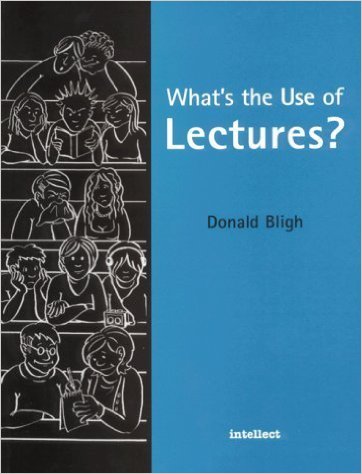« Bligh 1998 » : différence entre les versions
m (→1. Références) |
|||
| Ligne 14 : | Ligne 14 : | ||
== 1. Références == | == 1. Références == | ||
* '''Référence complète APA''' : Blight, D. (1998). What's the Use of Lectures? | * '''Référence complète APA''' : Blight, D. (1998). What's the Use of Lectures? Exeter: Intellect Press. | ||
<!-- Rappel de la syntaxe : | <!-- Rappel de la syntaxe : | ||
| Ligne 27 : | Ligne 27 : | ||
<br> | <br> | ||
== 2. Copies == | == 2. Copies == | ||
Dernière version du 26 octobre 2016 à 10:43
What's the Use of Lectures?
1. Références
- Référence complète APA : Blight, D. (1998). What's the Use of Lectures? Exeter: Intellect Press.
- Auteur(s) : Donald Blight
2. Copies
- Copie électronique en ligne :
- Copie électronique locale : chapitres 1 et 3 Fichier:Bligh Ch1 and Ch3.pdf
- Copie physique CP :
- Copie physique en bibliothèque :
3. Mots-clés
4. Quart de couverture
In one of the highest selling books on higher/further education to date, Bligh begins by arguing that lectures are most suitable for teaching information, not promoting thought or inspiring changes in attitudes.He goes on to detail the factors that affect the learning of information. The text is formed around a thorough consideration of the techniques of lecturing, including organization, how to make a point, use handouts, and obtain feedback, but it moves beyond lecturing to discuss alternatives when they are appropriate.
5. Table des matières (facultatif)
6. Résumé personnel (facultatif)
Ch 1. Evidence of what lectures achieve
- Les exposés sont aussi efficaces que d'autres méthodes pour transmettre de l'information (pas plus efficaces).
- Les discussions sont en général plus efficaces pour promouvoir la réflexion.
- Les exposés sont relativement inefficaces pour
- faire changer des valeurs
- inspirer de l'intérêt en un sujet
- faire acquérir des comportements
- développer des aptitudes personnelles et sociales
7. Voir aussi
